Saudi, Iranian Foreign Ministers To Meet Over Re-opening Embassies
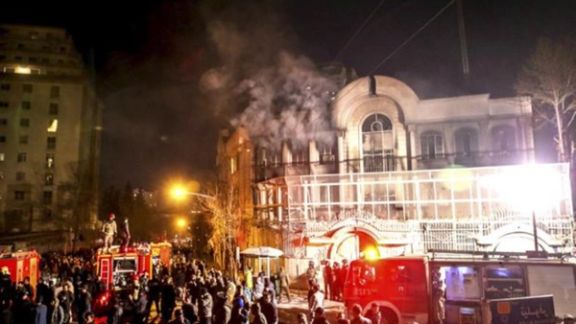
Iran’s and Saudi Arabia’s foreign ministers have agreed to meet soon to discuss the reopening of embassies under a deal earlier this month to restore ties.

Iran’s and Saudi Arabia’s foreign ministers have agreed to meet soon to discuss the reopening of embassies under a deal earlier this month to restore ties.
Diplomatic relations were severed in January 2016 after pro-regime mobs attacked the Saudi embassy in Tehran following the execution of a Shiite cleric in Saudi Arabia. Years of hostility followed that had threatened stability and security in the Persian Gulf and the Middle East.
Saudi Foreign Minister Prince Faisal bin Farhan Al Saud and his Iranian counterpart Hossein Amir-Abdollahian spoke by phone to mark the occasion of the Muslim holy month of Ramadan, Saudi state news agency SPA said.
Amir-Abdollahian emphasized during the call Iran's readiness to strengthen relations, Iran's official news agency IRNA reported.
The deal between the regional powers, Sunni Muslim Saudi Arabia and long-time rival Shi'ite Iran, brokered by China, was announced March 10 after previously undisclosed talks in Beijing between top security officials from the two countries.
Analysts say both sides stand to benefit from de-escalation, as Iran seeks to undercut US efforts to isolate it in the region and Saudi Arabia tries to focus on economic development.
The kingdom also has blamed Iran for missile and drone attacks on its oil facilities in 2019 as well as attacks on tankers in Gulf waters. Iran denied those allegations.
Yemen’s Iran-aligned Houthi movement has also carried out cross-border missile and drone attacks into Saudi Arabia, which leads a coalition fighting the Houthis, and in 2022 extended the strikes to the United Arab Emirates.
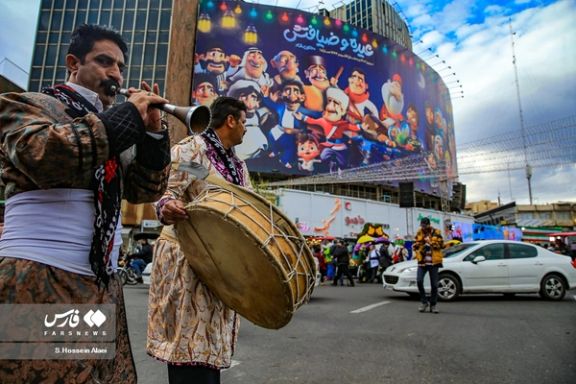
On the first day of the Iranian new year Media in Iran highlighted pessimism about the future, warning about the worsening political and economic situation.
Economic analyst Morteza Afghah told centrist news website Entekhab that tensions in Iran's domestic politics will escalate if the government fails to solve the country's economic problems and eliminate the impact of sanctions on the economy.
Afghah further argued that without resolving Iran's nuclear dispute with world powers and securing the lifting of US sanctions, back-breaking inflation in Iran will continue.
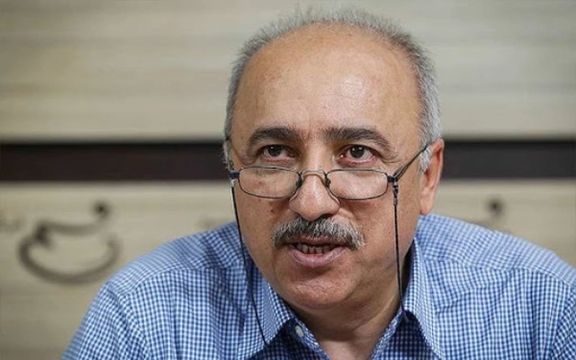
Talks with the West to revive the 2015 nuclear accord known as the JCPOA came to a deadlock last September.
Iran is experiencing an annual inflation rate of more than 50 percent for the second year in a row, with food prices rising between 70-100 percent.
The economist also argued that government officials do not realize how far their legitimacy has declined and people no longer believe their promises and statements. He added that the government expects the improvement in the ties with Saudi Arabia to bring about hope in the future of the economy, but without tackling the issue of the JCPOA and reducing regional tensions cannot solve all of the country's problems.
Meanwhile, in an interview with ILNA, conservative political activist Hossein Kanani-Moqaddam asked, "Why the government can negotiate with the enemies, but it is not prepared to hold dialogue with its own citizens?" Highlighting some of Iran's domestic and international political problems, Kanani called for negotiations between the government and political groups to put an end to the worsening impasse as almost all groups except ultraconservatives have been barred from candidacy in parliamentary and presidential elections.
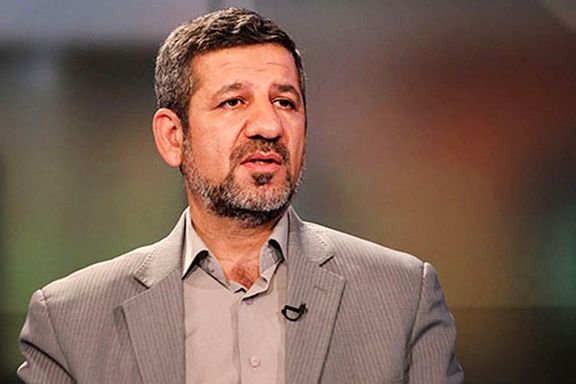
Kanani-Moqaddam further stressed the need for national reconciliation, which would bring various orientations to the forefront of political activity in Iran. "Political groups and organizations should be able to discuss problems with state officials and the people…as a way of addressing major problems." He also called for boosting political participation and "religious democracy" in Iran.
A report in moderate Rouydad24 website quoted Yahya Ebrahimi, a member of parliament, as saying that if lawmakers had been allowed to impeach some minister, the government would have better realized that the country was in a critical situation.
The remark highlighted complaints by many lawmakers during the past year about parliament Speaker Mohammad Bagher Ghalibaf preventing impeachment motions.
Ebrahimi warned that the political and economic situation in Iran is likely to be worsen in the coming months. The low-income strata of the society are going to suffer more than others as "wage-earners live under the poverty line as we have only two economic classes in Iran: The rich and the poor."
Ebrahimi further charged that the Iranian government has left the people to their own devices and is not doing anything to improve the situation. He added that "The current economic team is an insult to the nation's intelligence."
Ebrahimi warned that the social implication of this situation is far dangerous than its economic consequences. Students are abandoning schools, and cases of drug addiction and delinquency are on the rise.” Officials should be held accountable when impoverished people take to the streets in protest.

After a year when the rial lost about half its value and inflation surpassed 50 percent, the Islamic Republic decided to raise minimum wage by just 27 percent to about $100 to $110 a month.
The minimum wage has increased in rials but in comparison to the dollar, which was about 260,000 rials exactly a year ago and is now about 500,000, the workers lost a lot of purchasing power.
The minimum monthly salary rose from 41,790,000 rials to 5,308,000 rials (about $100 to $110) for the current Iranian year, which started on Tuesday, March 21. The minimum needed for an average family to simply survive is about $310 to $390 a month.
Iran has one of the lowest minimum wages in the world, but wages were increasing from 20 years ago to about 10 years ago when the minimum wage hit a record high of about $275 a month in 2010. This was when the United Nations Security Council began imposing economic sanctions to force Tehran to roll back its nuclear program.
In January 2023, minimum wages in the EU member states ranged from $410 per month in Bulgaria to $2,500 per month in Luxembourg.
Iranian workers were earning close to $300 a month before the United States imposed sanctions in 2018, which pushed Iran’s currency almost ninefold lower, creating inflation that wages have not kept up with.
The 27-percent increase, on the backdrop of rising prices -- especially foodstuff with 80 to 100 percent more expensive than a12 months ago – would likely lead to more labor protests and strikes this year, something that was already taking place regularly throughout the previous year. Rising prices and economic hardship have led to repeated labor strikes and nationwide protests since 2017, even before the imposition of US sanctions.
In his televised address early Tuesday, President Ebrahim Raisi claimed achievements for his administration, saying that sanctions on Iran failed, macroeconomic indicators improved, and thirdly, the public trust of the people in the regime increased. Several local media outlets dismissed his claims.
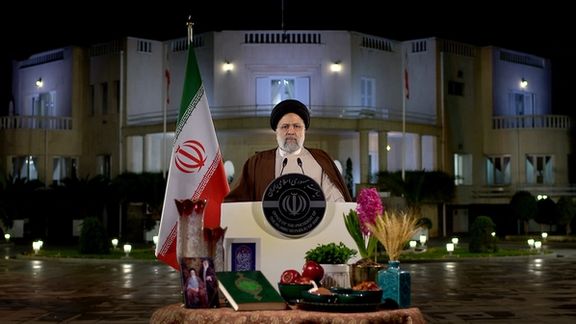
In addition to round after round of US sanctions on Iran, several European countries as well as international organizations adopted resolutions or punitive measures against the Islamic Republic. Countries such as Iraq that used to be a source of foreign currency income for Iran started cooperation with the United States, making it difficult for the regime to launder its oil revenues and funnel them back. Moreover, the negotiations to revive the 2015 nuclear deal – the JCPOA – collapsed indefinitely and the global call not to restore the accord is getting stronger.
Sanctions on the regime are actually working quite well despite the claims of more crude oil exports, as Tehran does not seem to be receiving any considerable sums in hard currencies. According to an article on Farazdaily published on Sunday, the government has signed $100 billion worth of interim investment deals in the form of memoranda of cooperation – the largest of which is a $40 billion one with Russia’s Gazprom -- but no binding contracts have been signed.
Oil Minister Mohammad Javad Oji insists that about $20 billion worth of oil and gas contracts were finalized in the previous Iranian year, but the catch is that most of the finalized contracts were signed with Iranian companies, which means no foreign investment and transfer of technology will materialize, the article added. There is no official information about any foreign firm that has agreed to invest in Iran and jeopardize relations with the US.
Iran’s centrally controlled economy is inefficient and not conducive to foreign investments, with high reliance on oil exports. With no legal and simple way to access its revenues and frozen assets, the Islamic Republic’s economic indicators are also in disarray, contrary to what President Raisi claimed.
According to a recent report, Iran’s misery index rose from 19.3 percent in 2018 to 49.4 percent in 2022, with estimates saying that the figure hit 56 percent by March 2023, which is the highest level in the past 27 years. The index is an economic indicator to determine how the average citizen is doing economically and is calculated by adding the seasonally adjusted unemployment rate to the annual inflation rate.
In the previous Iranian year, the country saw its boldest uprising against the Islamic Republic since its establishment in 1979. The antiregime protests that started in September 2022 flare up occasionally and could explode again under financial pressures.
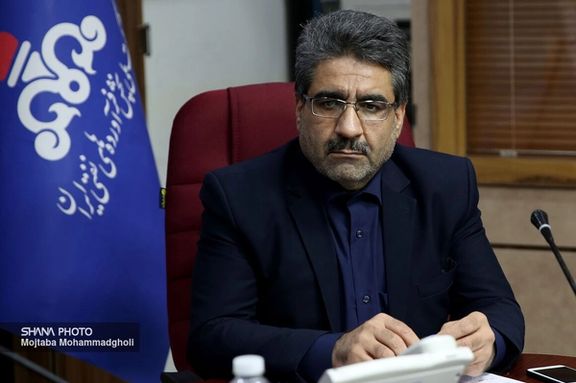
The National Iranian Oil Refining and Distribution Company has urged people to reduce gasoline consumption, just days after Iran International reported that national reserves are down to five-days supply.
CEO of the company Ali-Akbar Nejad-Ali announced that the daily gasoline consumption record was broken for the second time in recent days.
According to him, on March 20, 144,300,000 liters of gasoline was consumed in the country which shows an increase by 28% compared to the same day last year.
Iranian are travelling in large numbers during the new year, Nowruz, holidays every year, but this year after consecutive waves of the COVID pandemic, travel has increased.
Meanwhile, ISNA state news agency reported that between March 11 and 20, the average consumption of gasoline was 121.8 million liters, which has grown by 13.9% compared to the same period last year.
Iran International had earlier obtained a classified document outlining the proceedings of a meeting of various government officials from different departments at the presidential office in late February according to which strategic fuel reserves have dropped to a dangerously low level, forcing major repairs at refineries to be delayed allowing maximum production for the time being.
Participants in the meeting decided that the oil ministry should offer assurances to the public that it will help maintain the supply of fuel at normal levels. The meeting decided to advise officials to avoid any public comments that could be interpreted as an intention to raise fuel prices.
In November 2019, the announcement of the government’s decision to increase fuel prices by 50–200 percent triggered a cycle of protests and unrest across the country that lasted for over two weeks. During this time, angry protesters torched hundreds of gas stations, banks, and government buildings.
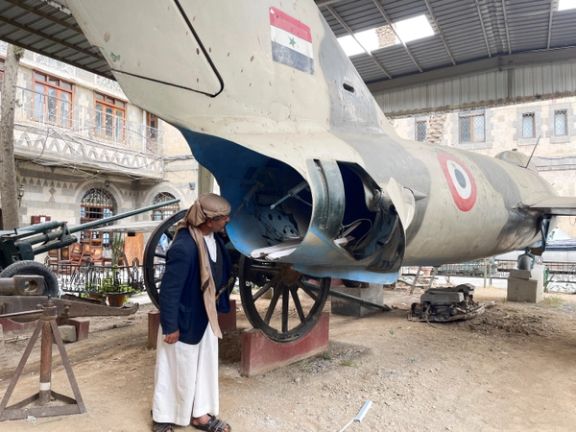
Just days after a deal between Tehran and Riyadh was struck to reduce tensions, Iran’s Yemen proxy risks jeopardizing its progress.
The Iran-backed Houthi militia launched an attack on the Marib province after 10 months of relative calm, throwing into doubt promises made by Tehran that it would reign in the activity of its Yemeni proxy, which has been in a bitter battle with the government-backed Saudi led coalition for eight years.
Earlier this month, Iran and Saudi Arabia agreed to re-establish diplomatic ties after Chinese-mediated talks in Beijing. The two sides agreed to reinstate embassies and missions after seven years of deadlock.
But after the latest flare-up, doubts have been raised about Tehran’s commitment to the proposals.
It is in Riyadh’s interest to end the Yemen conflict as it tries to achieve security, following several attacks on its home soil from the Houthi forces, but after the latest military action, it appears Tehran may not be so willing to fulfil its side of the deal.
Yemen has been mired in violence since the Houthis ousted the government from Sanaa in late 2014, prompting the Saudi-led coalition to intervene months later.
Marib is the last stronghold in northern Yemen of the internationally recognized government and is the country's sole gas producing region with a large oilfield.
The conflict is widely seen as a proxy war between Riyadh and Tehran. It has killed tens of thousands of people, wrecked Yemen's economy and pushed millions into hunger.
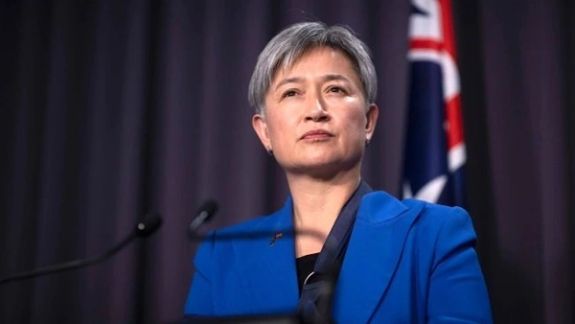
Australia’s Foreign Minister Penny Wong has condemned the regime’s human rights abuses against the people of Iran.
In a tweet Wednesday, she claimed she had expressed Australia's condemnation of Iran's brutal crackdown on protests, execution of protesters and oppression of women and minorities in a phone conversation with Hossein Amir-Abdollahian, her Iranian counterpart.
She also said that “she conveyed concerns over foreign interference” referring to recent reports presented in the Australian Parliament, claiming Iran’s Revolutionary Guard Corps agents targeted organizations in Australia with cyber-attacks in order to use their information for extortion.
“We will not tolerate surveillance or harassment of Iranian-Australians. We employ every strategy at our disposal - including dialogue - towards upholding human rights, consistent with our values and with our interests,” reads her tweet.
The phone conversation between Wong and Amir-Abdollahian came a few days after Canberra imposed new sanctions against Iran for violating human rights and providing Russia with drones to use in the Ukraine war.
Targeted financial sanctions and travel bans will now apply to 13 Iranian individuals and targeted financial sanctions on one entity involved in the production and supply of drones to Russia. Australia is among a growing list of foreign nations punishing members of the regime and its organizations with sanctions.
Sanctioned targets also include senior law enforcement, political and military figures, including within the Islamic Revolutionary Guard Corps, the regime's agency involved in the violent crackdown on protests following the death of Mahsa Amini and the continued oppression of the people of Iran.